The Health bulletin [serial] - University of North Carolina at Chapel Hill
The Health bulletin [serial] - University of North Carolina at Chapel Hill
The Health bulletin [serial] - University of North Carolina at Chapel Hill
Create successful ePaper yourself
Turn your PDF publications into a flip-book with our unique Google optimized e-Paper software.
December, 1927 <strong>The</strong> <strong>Health</strong> Bulletin 19<br />
<strong>The</strong> business and economic world is<br />
becoming more and more interested in<br />
the issue <strong>of</strong> public health. It is beginning<br />
to reckon in new terms the value<br />
<strong>of</strong> health as a factor in its own wellbeing.<br />
Th<strong>at</strong> is the reason for the institution<br />
<strong>of</strong> so many public health measures, the<br />
reason th<strong>at</strong> government is reaching its<br />
strong arm out and demanding <strong>of</strong> the<br />
people th<strong>at</strong> they do this and th<strong>at</strong> in<br />
order th<strong>at</strong> the community may enjoy<br />
a better degree <strong>of</strong> health. It cannot<br />
THE ECONOMICS OF HEALTH<br />
afford to be sick and th<strong>at</strong> is the assumption<br />
on which government is proceeding.<br />
<strong>The</strong> cost <strong>of</strong> illness to industry has<br />
never been determined N<strong>at</strong>ionally, but<br />
one prominent manufacturer with an<br />
annual payroll <strong>of</strong> approxim<strong>at</strong>ely $5,000-<br />
000 estim<strong>at</strong>es the total annual cost <strong>of</strong><br />
illness to his business, including charges<br />
for idle machinery and loss in production,<br />
to be $287,500. <strong>The</strong> loss to the<br />
individuals and the community due to<br />
the illness <strong>of</strong> his employes is estim<strong>at</strong>ed<br />
to be .$303,000 annually. This takes<br />
into consider<strong>at</strong>ion direct loss <strong>of</strong> wages,<br />
indirect loss <strong>of</strong> earning capacity after<br />
illness, medical and nursing expenses,<br />
public expenses and charitable relief.<br />
In a number <strong>of</strong> leading stores six<br />
days lost per individual each year from<br />
illness and injury proved an average<br />
experience. For a working force <strong>of</strong><br />
1,000 people <strong>at</strong> an average wage <strong>of</strong> $3<br />
per day this amounts to $18,000 a year<br />
in direct wage lo.ss alone. Industrial<br />
medical sui^ervision <strong>at</strong> an average annual<br />
cost <strong>of</strong> several dollars per worker<br />
<strong>of</strong>fers one method <strong>of</strong> reducing such<br />
losses. — <strong>The</strong> Charlotte News.<br />
purchased a '•loan cow," known as the<br />
"Red Cross Loan Cow," for the purpose<br />
<strong>of</strong> lending to poor families<br />
throughout th<strong>at</strong> county who need miik<br />
but are not able to purchase it. Come<br />
to think about it, the Red Cross has<br />
probably spent a lot <strong>of</strong> money in time<br />
past th<strong>at</strong> did not have anything like<br />
the practical appeal th<strong>at</strong> this undertaking<br />
should have.<br />
<strong>The</strong> Children's Bureau News Notes<br />
says th<strong>at</strong> "<strong>The</strong> cow was procured sometime<br />
ago when there was reported a<br />
pitiful case <strong>of</strong> an entire family destitute<br />
and suffering from pellagra. Milk<br />
was essential to their recovery, and a<br />
cow was bought by popular subscription,<br />
to be owned by the chapter and<br />
loaned to the family. Since the recovery<br />
<strong>of</strong> the pellagra victims the cow has<br />
been loaned to other needy families, and<br />
has been found to be an asset in the<br />
relief work <strong>of</strong> the Red Cross chapter<br />
which is the only organized relief<br />
agency functioning throughout Greenville<br />
County."<br />
<strong>The</strong> foregoing arrangement may be<br />
pretty bad on the cow, but it certainly<br />
should afford a very present help in<br />
trouble to quite a number <strong>of</strong> families<br />
needing milk and not able to get it<br />
otherwise.<br />
A COW TO LOAN<br />
<strong>The</strong>re may not be anything new under<br />
the sun, but through the Weekly<br />
News Notes the Child Welfare Topics<br />
sent out by the Children's Bureau <strong>at</strong><br />
Washington sometime ago we ran<br />
across an item th<strong>at</strong> is certainly news<br />
to us. It may have been in practice<br />
a long time, but the writer <strong>of</strong> this<br />
article certainly had never heard <strong>of</strong> it<br />
before. <strong>The</strong> item describes how the<br />
American Red Cross chapter <strong>at</strong> Greenville,<br />
South <strong>Carolina</strong>, sometime ago<br />
Who Says I Am Not a Man


![The Health bulletin [serial] - University of North Carolina at Chapel Hill](https://img.yumpu.com/33495252/377/500x640/the-health-bulletin-serial-university-of-north-carolina-at-chapel-hill.jpg)
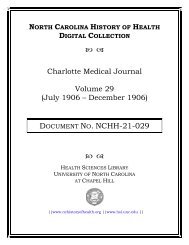
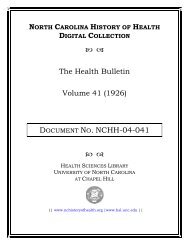
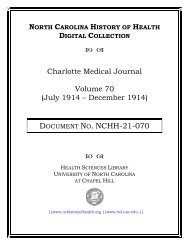
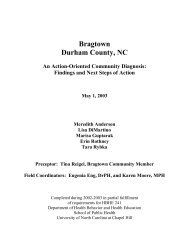
![Bulletin of the North Carolina Board of Health [serial] - University of ...](https://img.yumpu.com/48032016/1/153x260/bulletin-of-the-north-carolina-board-of-health-serial-university-of-.jpg?quality=85)
![The Health bulletin [serial] - University of North Carolina at Chapel Hill](https://img.yumpu.com/47603625/1/169x260/the-health-bulletin-serial-university-of-north-carolina-at-chapel-hill.jpg?quality=85)
![The Health bulletin [serial] - University of North Carolina at Chapel Hill](https://img.yumpu.com/47242858/1/169x260/the-health-bulletin-serial-university-of-north-carolina-at-chapel-hill.jpg?quality=85)
![The Health bulletin [serial] - University of North Carolina at Chapel Hill](https://img.yumpu.com/43204263/1/172x260/the-health-bulletin-serial-university-of-north-carolina-at-chapel-hill.jpg?quality=85)
![The Health bulletin [serial] - University of North Carolina at Chapel Hill](https://img.yumpu.com/41981074/1/163x260/the-health-bulletin-serial-university-of-north-carolina-at-chapel-hill.jpg?quality=85)
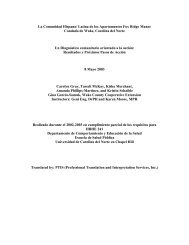
![The Health bulletin [serial] - University of North Carolina at Chapel Hill](https://img.yumpu.com/40912928/1/164x260/the-health-bulletin-serial-university-of-north-carolina-at-chapel-hill.jpg?quality=85)
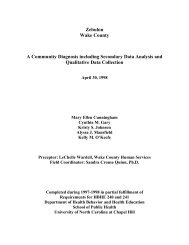
![The Health bulletin [serial] - University of North Carolina at Chapel Hill](https://img.yumpu.com/35643061/1/167x260/the-health-bulletin-serial-university-of-north-carolina-at-chapel-hill.jpg?quality=85)
![Biennial report of the North Carolina State Board of Health [serial]](https://img.yumpu.com/34024350/1/166x260/biennial-report-of-the-north-carolina-state-board-of-health-serial.jpg?quality=85)
